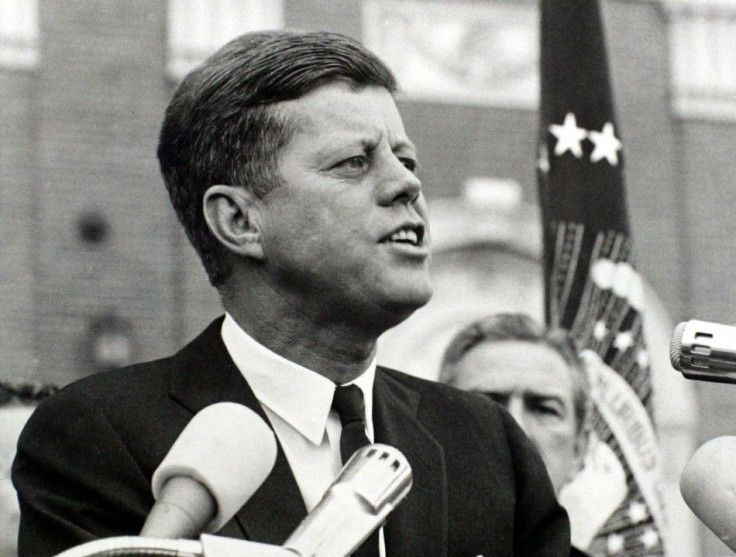The French Connection: Did Corsican Mobsters Kill John F. Kennedy?

One of the most enduring mysteries of 20th century history is the 1963 assassination of U.S. President John F. Kennedy, an event so shocking and cataclysmic that it continues to hold a grip on the imagination of tens of millions around the globe.
The determination by the Warren Commission that the murder was committed solely by one man, Lee Harvey Oswald, has satisfied no one and only fortified the belief of many that the young president was the victim of a massive conspiracy.
Hundreds of books and documentaries and untold thousands of newspaper and magazine articles have studied the killing – analyzed and dissected it from all possible angles – and presented their own (often conflicting) theories.
The list of possible suspects spans a bewildering array of shadowy and/or nefarious candidates – from Communist agents of Fidel Castro to anti-Castro Cubans to Russian KGB operatives to the CIA to the FBI to the Dallas Police Department to right-wing Texas oilmen and to elements of organized crime.
Indeed, it is that latter entity – La Cosa Nostra, the American version of the Sicilian Mafia – that seems to attract the most interest and speculation from the broader public.
If the Mafia did indeed carry out the so-called “crime of the century," the theory goes, it was motivated by a desire to kill not only John F. Kennedy, but also his brother, Attorney General Robert F. Kennedy, who was cracking down on the mob from his very powerful perch in Washington. The “men of honor” apparently were outraged that the Kennedy brothers (whose father Joseph had long been deeply involved with Mafiosi in various illegal enterprises) failed to reciprocate efforts by Chicago mob boss Sam "Momo" Giancana to “guarantee” a Kennedy victory in the 1960 presidential election.
Moreover, if U.S. mobsters were involved in the assassination, they may have perpetrated the murder in cooperation with their brethren from thousands of miles away: the French/Corsican mob.
In the 1950s and early 1960s mobsters on both sides of the Atlantic commenced an extremely ambitious, complex (and hugely lucrative) conspiracy to smuggle billions of dollars of heroin from Europe to the United States, the notorious "French Connection."
The plot lasted for years and involved thousands of operatives – from opium farmers in Turkey to drug refiners in Sicily and ultimately to buyers in the hungry markets of the U.S.
Mobsters from the French Mediterranean island of Corsica, who used the mainland French city of Marseilles as a key transshipment point, played a key role in this heroin smuggling operation -- and may also have participated in the murder of an American president.
This is where a Frenchman named Antoine Guerini enters the murky picture.
Born in Marseilles, Guerini belonged to a French arms smuggling group during World War II and ultimately climbed to the top of the port city’s organized crime syndicates, which included a massive heroin smuggling business.
A journalist and author named Stephen Rivele alleged that in 1981 a Corsican gangster and drug trafficker named Christian David told him that Guerini organized the Kennedy assassination and that the actual shooters were a Corsican drug dealer and hitman named Lucien Sarti and two other Marseilles mobsters. (David allegedly turned down the murder contract himself.)
David told Rivele that prior to the assassination, Sarti flew from France to Mexico, then crossed the border to Texas, where he met someone from the Chicago mob. From there, they drove to Dallas.
After the successful hit on Kennedy, David alleged, the CIA knew about and covered up their activities, while the shooters were eventually spirited away to safety in Canada and back to Europe (perhaps with help from the Montreal mob).
Rivele, who wrote several books as well as screenplays for high-profile Hollywood film biographies on Richard Nixon and Muhammad Ali, claimed that both the CIA and KGB confirmed his accounts.
Guerini was himself murdered by two assassins in 1967 in Marseilles, reportedly over control of an international gambling syndicate.
But who in the U.S. mob helped Guerini?
Many books and experts point their fingers at two of the most powerful Mafia figures of the southern United States: Carlos Marcello, the boss of Louisiana (with extensive connections in Dallas); and Santos Trafficante Jr. (the boss of South Florida who enjoyed a virtual free hand in Havana before the revolution).
Marcello, a particularly diabolical gangster, fiercely hated the Kennedys and had deep links to the European mob. Marcello was once even temporarily deported to Guatemala by the Kennedys, thereby earning his eternal wrath. Rivele believes it was Marcello who ordered the murder contract (through Trafficante) to Marseilles organized crime.
Frank Ragano, Trafficante’s longtime attorney, wrote explicitly in his autobiography, "Mob Lawyer," that his friend and client was responsible for the assassination – but that the order came from Teamsters union boss Jimmy Hoffa, who bore a serious grudge against Bobby Kennedy for prosecuting him for corruption.
After the killing, Ragano claimed Hoffa told him: "I told you that they could do it. I'll never forget what Carlos and Santo did for me. … This means Bobby is out as attorney general." Soon afterwards, Marcello allegedly told Ragano: "When you see Jimmy, you tell him he owes me and he owes me big."
Indeed, Jack Ruby, the Dallas-based hoodlum who shot Oswald to death before he could testify, was closely linked to both Trafficante and Marcello.
But did Marcello and Trafficante really “hire out” the job to kill Kennedy to French and Corsican assassins?
Understandably, since Marcello and Trafficante were already on the radar of law enforcement, they clearly could not hire their own men – nor anyone remotely associated with them – to satisfy the contract.
Almost all the players in this complex web of intrigue are long since dead, hence the truth will likely never come out.
© Copyright IBTimes 2024. All rights reserved.











